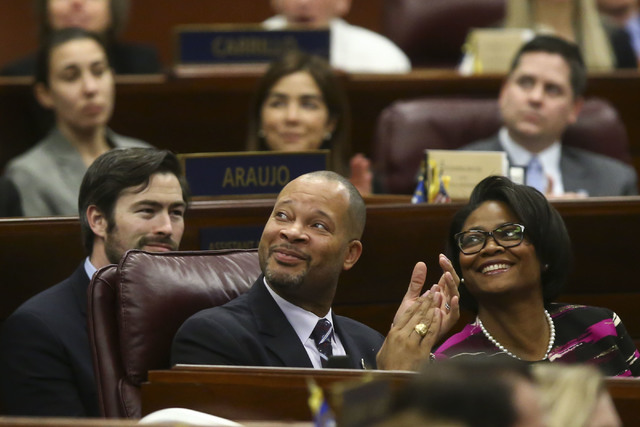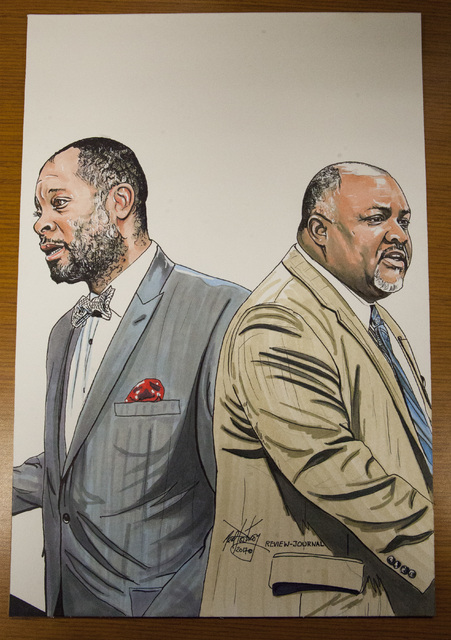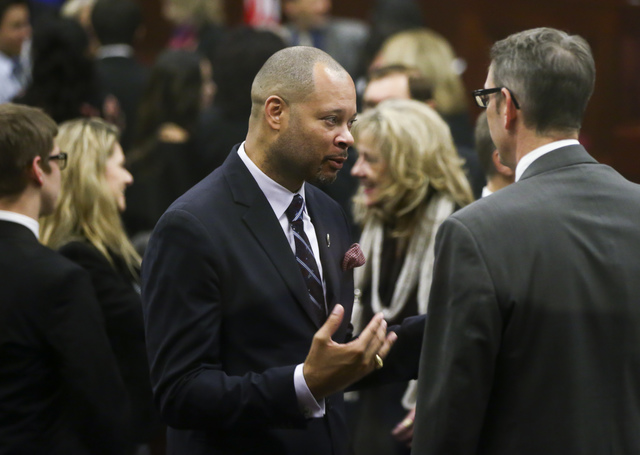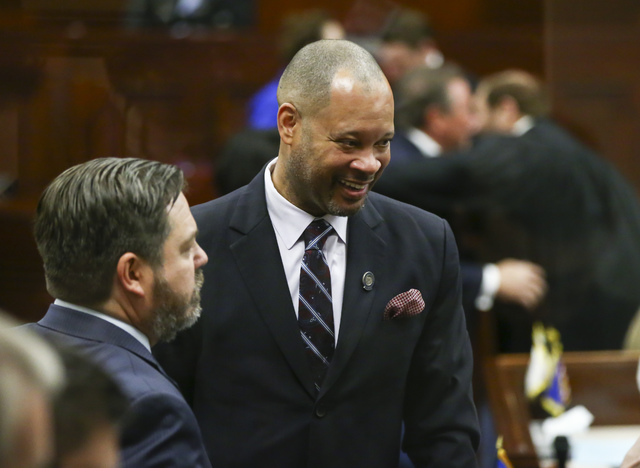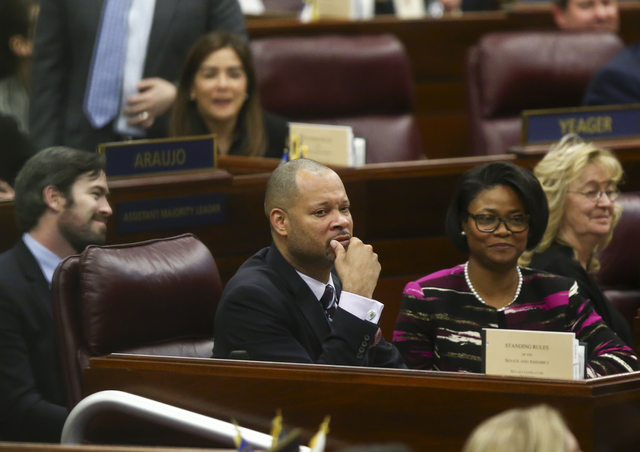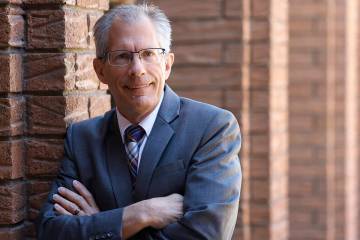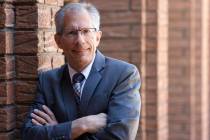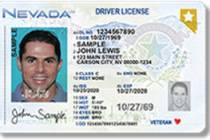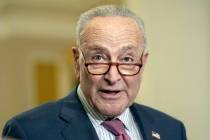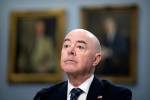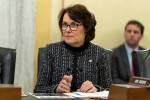Life experiences have shaped political outlook for Nevada Senate leader Ford
CARSON CITY — As a youngster in Texas, Aaron Ford didn’t know his family was poor. It was just a fact of life that utilities — water, gas — got shut off sometimes. You dealt with it.
“I just believed this is how folks lived,” said the Democrat, who on Monday takes command in the Nevada Senate as majority leader when the 2017 Legislature convenes.
“I remember my mom saying to me, ‘When you grow up and get an apartment, make sure you have an electric stove — and gas, for other things.’”
Why?
“Because if the gas ever gets cut off, you can boil water on the electric stove and poor it in the bathtub for a hot bath. And we did that several times,” Ford said.
His dad would jigger the gas hookup outside to turn it back on. And his mom got angry when Ford or his two little brothers forgot to fill the water jugs.
“We used to fill up our milk jugs with water and put them in the refrigerator, because if the water got cut off, we need to have something we could drink,” Ford said of his humble beginnings.
DRIVEN, NOT DEFINED
His mom’s advice on how to survive poverty could have foretold his future. It didn’t.
“My background, I’m not ashamed of it,” Ford said during a recent interview in Carson City. “It makes me who I am. It forms the thought process on everything I do.”
Ford, 44, becomes the second African-American to hold the top Senate leadership post in Nevada. He was minority leader in 2015, and there was no question within the Democratic caucus he should be majority leader, said State Sen. Mark Manendo, D-Las Vegas.
“He has the expertise and political savvy to be able to guide our Senate Democratic caucus for the 2017 session,” Manendo said.
Ford was elected in 2012, after losing in 2010 when ran for a different Senate seat.
An impeccable dresser, Ford is known for crisp suits and a seemingly endless assortment of bowties — almost enough to wear a different one every day of the 120-day session. He speaks Spanish fluently and holds five college degrees: a bachelor’s, two master’s, a doctorate — all in education — and a law degree.
He will shepherd the Democratic agenda in the upper chamber and try to muster support and consensus from Republican Gov. Brian Sandoval and his GOP colleagues.
“We’re going to focus on those things that expand and protect the middle class,” Ford said. “We’re looking at ensuring women have equal pay for equal work. Earned sick leave. College affordability.
“Our economic message is going to be robust. Deal with minimum wage. Find ways for people to actualize their abilities through economic opportunity.”
He supports gun rights, but he adds that other constitutional amendments are just as important.
SCHOOL CHOICE
Senate Minority Leader Michael Roberson, R-Henderson, issued a pre-session threat: If Democrats don’t include Education Savings Accounts — a program to use tax dollars for private school tuition — Republicans will vote against the budget.
Will Democrats take up ESAs?
“I doubt it. But I don’t know,” Ford said. “Our focus is on ensuring public education is properly funded.”
Ford gets annoyed by critics who say Democrats are against school choice.
“The truth is we support school choice,” he said. “We support it in the public context.
“We have opportunities for charter schools. We have open enrollment. We have home schooling. So there are public options for school choice that we could be using that money on.
“To say we don’t support school choice because we don’t support vouchers is just flat-out wrong,” Ford said.
EARLY ADULTHOOD
Poverty was only one challenge in Ford’s early life.
His folks divorced when he was 10. “I became the man of the house.” While his mother worked nights, he cared for his brothers, making sure they were fed and got to bed on time.
When his mother remarried, Ford’s relationship with his stepfather was strained. “We didn’t get along,” Ford said, conceding he himself was “belligerent.” For years the adolescent-with-an-attitude called his stepdad “Mr. Claiborne.”
But time, and the example his stepfather set, thawed the icy discord.
“At the end of the day, I’ve looked up to him now as an example of a selfless guy who came into a ready-made family,” Ford said. “He adopted us in the figurative sense as his own kids.
“Now I call him Daddy Joe.”
A YOUNG DADDY
Ford learned quickly the responsibility of being “daddy.” It was 1993. He was 21, attending Texas A&M University on a partial scholarship and about to embark on a year of study in Mexico when his girlfriend gave birth to their son, Avery.
With the help of family, his girlfriend continued in college, and Ford went to Mexico. But he cut his study abroad short when the couple broke up and he gained custody of the infant.
Ford moved into public housing and went on welfare. He was keenly aware of the likely trajectory of people in poverty. He saw what happened to others from his neighborhood. Some were in jail, and some ended up dead.
“My impetus was to be just the opposite of what I saw in the first part of my life,” Ford said.
He met his wife, Berna, a short-time later, while she was finishing her law degree. They moved to Nevada in 2000. They have two other sons — Aaron Jr., aka “Deuce,” and Alexander — and raised Ford’s nephew.
All went to public school, though Deuce, an intellectual genius, received a scholarship and now attends an elite boarding school on the East Coast.
THE ‘TALK’
In 2015, Ford sponsored a bill seeking to require police to wear body cameras to protect the public and police officers alike. The final legislation signed by the governor pertained to state troopers. But the measure sparked discussion of police interactions with the public, particularly minorities, amid headlines on use of force from around the country — Ferguson, Missouri; Baltimore; Chicago; Florida.
In committee hearings and on the Senate floor, Ford has often remarked about having “the talk” with his sons — about how, rightly or wrongly, things are different for people of color.
“We have that talk every time something comes up, and it’s heartbreaking to have to have that conversation,” Ford said.
He presses upon them that it’s not fair, but they have to be more concerned about how they look, how they act and how they talk.
“My kids don’t sag their pants. My kids don’t wear cornrows … because I won’t let them in fear of the fact they’re going to be profiled in a sense,” Ford said.
But Ford also takes pride in Nevada’s ethnic diversity and the gains made since it was dubbed the “Mississippi of the West” for racial segregation and discrimination in the middle of the last century.
“How many states do you know … that has three ethnic minorities leading the state?” he asked.
He points to Sandoval, Nevada’s first Hispanic governor; incoming Assembly Speaker Jason Frierson, the first African American to hold that post; and Ford’s own place as leader of the Senate.
Ford’s second-in-command is Sen. Kelvin Atkinson, a gay black man. Assemblywoman Teresa Benitez-Thompson, a Latina, is majority leader in the lower house.
“We have in our state an opportunity to continue to reflect what our state is about and what it looks like, and that is inclusion and fairness and equal treatment for all folks,” Ford said.
Contact Sandra Chereb at schereb@reviewjournal.com or 775-461-3821. Follow @SandraChereb on Twitter.



